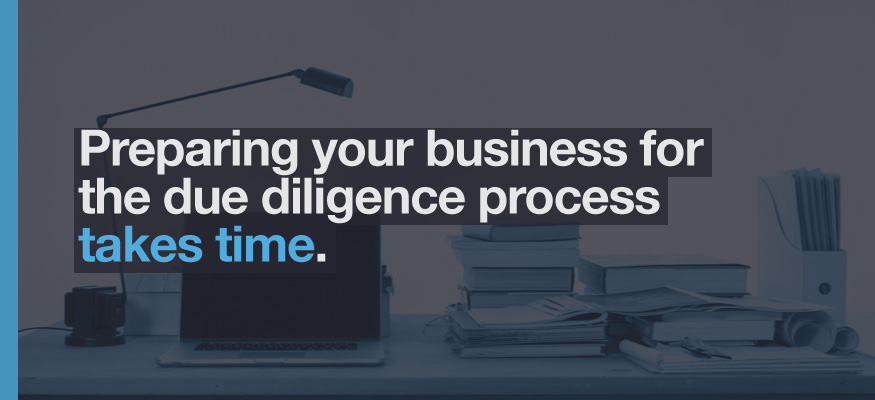- How to find the best time to sell your business
- Prepare your business for high-value offers
- Assessing your broker before hiring
- How you make your business more attractive to buyers
- How to pre-qualify buyers so you don’t waste time with the wrong ones
Selling a business takes several months—even years—to complete.
Because of the details involved in each step, it is easy to make a mistake that can reduce your gains from the sale, put your business in the wrong hands, or extend the process even longer.
In this ultimate guide, we'll take you through each step of this journey so you close a successful transaction, get the offer you deserve, and sell to the right person.
And when you apply these steps correctly, you can sell your business faster.
A Summary of the Steps to Sell Your Business Fast

The steps involved in selling a business vary according to the size of the company. Small companies typically require fewer details than larger businesses. Also, it typically takes a shorter time to close the sale and hand the small business over to the new owner.
Regardless of their size, however, there are steps in this venture that are necessary for success.
When you follow these steps correctly, with the right help by your side, it will not take long to complete the sale.
Here are the steps for selling your business:
- Prepare to put your business on the market
- Time the sale for the right moment
- Calculate the value of your business
- Get professional help — broker, lawyer, and accountant
- Perform sell-side due diligence
- Put your business on the market
- Pre-qualify buyers
- Allow buy-side due diligence
- Close the deal with a smooth transition and handover
According to Inc.com, 54% of brokers advise sellers to expect selling their business to last 6 to 11 months. While SCORE, a nonprofit for entrepreneurs and partners of the U.S. Small Business Administration suggests it could take up to 2 years.
Although it is difficult to accelerate the process, smart preparation, excellent timing, and experienced assistance will ensure your transaction doesn’t hit a snag and drag on for years.
If you're interested in selling your business and you want to find out how much it's worth, fill out the form below.
How to Prepare Your Business to be Sold
Because of the detailed activities involved in selling a business, it’s best to start preparing years before your exit.
The due diligence process that the buyer conducts will check all relevant historical business data from 3 to 4 years in the past.
If you plan to sell in the next 3 years, now is the time to organize your financials and other records. But if you intend to sell this year, iron out your older records dating back to 4 years.
You may wonder, “Is this really necessary?”
Yes, it is. Buyers need evidence about the profitability of the business and the true value of the business. They require enough information to better assess the quality of the investment they’re about to make.
Also, this preparation will help you facilitate a seamless transition when the sale is complete.
Without this data, it can feel like taking a shot in the dark. And that risk isn’t attractive to any savvy buyer.
To prepare your business:
- Get your financial records and tax returns in order
- Gather all legal documents such as contracts and agreements, leases, etc.
- Collect relevant information about your customers
- Document business operations, organizational structure, and systems
- Record inventory and business assets correctly
When is the Best Time to Sell a Business?

The economy, your industry, government policies, and regulations — these are external factors that affect buyers’ interest in your business. The higher the interest, the higher the value of your business.
Timing the sale of your business correctly is vital in landing a great deal. Going to market at the wrong time can end in two ways:
- No sale (only 20-30% of businesses that go to market end up selling), or
- Selling at a cheap price
The internal factors that affect your business’s value—and therefore indicate it’s a great time to sell—are much within your control. These are:
- A steady stream of increasing profits
- A significant ratio of repeat customers
- A large long-term contract
All of which are signs that your business is doing well and will continue to do so. This translates to great profitability potential and a higher value in the eyes of buyers.
It is best to sell your business when the business is doing well, and the market is favorable.
So stay up-to-date with current trends in your industry and sell when the business is in tip-top condition. If it’s not in great condition, begin working now to get it there.
How to Determine the True Value of Your Business
An accurate value of your business is satisfactory to you and the buyer. Anything less or more, and one party might feel cheated, and the sale may break down.
You don’t have to do this yourself and risk obtaining the wrong valuation for your business. You can use Acquira’s starting point for sellers or hire an appraiser.
But for you to get a sense of your business’s worth without hearing it from someone else first, do this:
1. Add up your assets
Sum up the value of everything the business owns—like real estate, tangible goods, equipment—and then subtract liabilities.
But that’s not all…
2. Calculate based on revenue
There’s a particular value a business carries based on its annual financial performance that varies according to industry. Based on your business’s yearly income, determine (with the expert help of a broker or an appraiser) how much should be the asking price for your business.
Sometimes this could be 2-3x your annual revenue.
3. Use EBITDA multiples
According to Investopedia, “EBITDA, or earnings before interest, taxes, depreciation, and amortization, is a measure of a company's overall financial performance and is used as an alternative to net income in some circumstances.”
Basing a company’s value on multiples of its EBITDA is a popular valuation model. Depending on the size of the company, this multiple can be somewhere from 2 to 10 times.
For instance, a small business making $450,000 a year can be worth $1.35 million.
4. Perform a discounted cash-flow analysis
Here, you use a formula to calculate how much a business can make in the future based on previous earnings. And then discount those future earnings to today’s value. You can do this net present value (NPV) calculation for free online.
5. Factor in other strategic value
This can be geographical location, online reputation/popularity, competitive advantage, brand strength, customer diversity, trademarks, established processes, etc.
It is hard to put a monetary value on these, but it is necessary for you to factor this into the total value of your business.
Should You Sell Your Business Yourself or Get a Broker?
In some situations, you can do without a broker. Like when you’re selling a small business to a trusted friend or family member. If you’d like to learn more about how to sell without a broker, check out this little link.
But in most other cases, a broker is crucial to the deal.
Due to the nature of the deal—its sensitivity and the amount of attention required to make it a success—you’ll need a professional broker to assist you. They can help you free up time to keep the business running and attractive to buyers.
However, you should know that most brokers charge 10% of the value of the sale. Acquira charges 1% to market your business to vetted and ready-to-buy acquisition entrepreneurs.
Before you hire someone to broker the sale of your business, there are questions to ask. An excerpt of Barbara Findlay Schenck’s book Selling Your Business for Dummies on Inc.com inspired these questions:
1. How qualified are you? — Your ideal broker should be a Certified Business Intermediary (CBI) and/or a member of the International Business Brokers Association (IBBA). You can confirm here.
They should also have successfully brokered similar deals in the past, as well.
2. What is your plan for marketing this deal? — Your broker should have more than one way to reach buyers.
Do they have a database of qualified buyers to reach out to? Do they use business-for-sale listing sites? And which one? Do they place classified print ads?
3. How much do you charge for your brokerage services — Usually, this is 10% of the amount paid for your business. Ask about additional fees as well.
4. How do you determine the value of a business? — What method do they use to determine the asking price for a business? What’s the approximate difference between the asking price and the closing price that you should expect?
5. What is your past performance like? — Find out how successful they’ve been on previous deals. Ask for testimonials from clients who’ve listed with this broker, and request the contacts of references you can reach out to.
6. What other things should I know about using your services? — Most brokers make you sign an exclusive listing agreement, which gives them the right to be the only one to list your business for a certain amount of time.
You ought to know things like this before you start. Because in this case, if you bring your own buyer, the broker still gets 10% even if they didn’t put in any work. So, ask to negotiate a carve-out.
A carve-out is a limited exception for a specific buyer prospect, such as the one you intend to bring in at some point during the listing.
Dig deeper to understand some nuances that might be involved in your deal with your broker.
Where to Find Buyers for Your Business
Listing your business correctly in a good marketplace can help you sell your business fast.
Some of the most popular places for listing your business for sale are:
- BusinessesForSale
- LINK
- BizBuySell
- BizQuest
- Exchange Marketplace
- BusinessBroker.net
- BusinessMart.com
- DealStream
- LoopNet
- Bizsale
However, there’s a better way to go — Acquira. Acquira helps business owners sell their businesses quickly in a manner that protects their team, culture, and keeps their businesses operating for the long term.
You’ll get legal and accounting assistance to sell your business to vetted acquisition entrepreneurs who are actively looking for businesses to buy. Plus, we are showing your deal to Acquira-vetted buyers, which means they have been through our Acceleration Program.
The first step to selling your business with Acquira is to find out how much it's worth.
If you choose to list your business on one of the sites above, maybe to broaden your options, these are some best practices to keep in mind:
- Use a strong, specific, and inviting headline
- Make sure your contact information is accurate, and
- Add high-definition pictures of your business without revealing its identity
After listing your business, you’ll get buyers interested in your offer. It may take some time in different cases, but eventually, the offers come.
Ensure you pre-qualify your buyers so you don’t waste time pushing the sale with tire kickers.
Ask these questions for a start to pre-qualify buyers before moving forward with the deal:
- Have you secured funding for this deal, or do you have sufficient capital?
- Do you have the experience to run this type of business?
- When do you intend to complete your purchase?
You can request a financial statement from the prospective buyer to be sure they can handle the operation of the business for at least 6 months after the purchase.
Clear, open communication with the prospect will help you avoid walking into a transaction that was destined to fail from the outset. As you avoid these common time-wasters, you also speed up the sale of your business.
Note: Before you discuss details of your offer with an acquirer, make sure they sign a non-disclosure agreement (NDA) so as to keep your sale confidential.
How to Streamline the Due Diligence Process and Sell Your Business Quickly
No expert telling you how to sell a business quickly would skip over due diligence, which is typically the longest step.
With the right team on your side (broker, attorney, CPA, appraiser, and personal financial planner) and careful preparation of the required documents, this should be straightforward for both the seller and the buyer.
In this step, the buyer wants to confirm that your business can deliver the anticipated numbers while getting to know it as intimately as possible.

Preparing your business for the due diligence process takes time. The larger the company, the longer it takes. Get an idea of what documents will be required and prepare them long before you intend to sell.
What you need to put in order to streamline your due diligence process and sell your business fast are:
- Financial documents — audited income statements, invoices, balance sheets, etc
- Legal documents — employee agreements, leases, customer contracts, etc
- Customer base — customer reports, testimonials, and contacts, etc
- Operations and organizational charts — details of day-to-day business processes, management systems, customer relations, vendors, software licenses, etc
- Marketing — a list of competitors, market research reports and surveys, advertising campaigns, marketing collaterals, etc
- Inventory and assets — a list of equipment, properties, presence of questionable inventory, etc
- Intellectual property rights — trademarks, copyrights, patents, trade secrets, etc
- Culture — some buyers will like to know if the culture of the company is compatible with theirs
- Reputation — community relationship, customer perception, online reputation, employee relationships
Higher-risk deals will go into the deepest detail of every aspect of the business. But selling a small business quickly might require a less in-depth due diligence process.
FAQ
Rushing through any transaction is not advisable. But you can significantly reduce the time you spend on each step by getting professional guidance and help. A broker, lawyer, accountant, and appraiser can help — or you can get all-in-one with Acquira.
You can use modern tech to augment many of the physical requirements for completing a sale. Although nothing beats in-person meetings, you can use Skype, Google Meet, or Zoom to have your meetings and use DocuSign, Adobe Acrobat, and DocHub to sign documents.
Using a broker costs between 10-12% of the value of the deal. That is the broker’s commission. You will also spend money on hiring an accountant, an attorney, an appraiser, or a valuation firm and listing and marketing your business. With Acquira, you spend 1% of the deal for all that.
Prepare an agreement outlining how ownership will be shared. Make sure you detail the terms of the agreement for both the exiting and staying partners.
Key Takeaways
The quickest answer to the question “How can I sell my business fast?” is this:
- Get help from experienced professionals
- Prepare for the sale 2-4 years before your intended exit
- Time your sale for when your business is pulling in a steady income, and
- Pre-qualify prospective buyers before moving forward with the deal with them
Do you want to sell your business? Let Acquira help you remove the frustration from the process and complete a smooth sale that protects your team, company culture, and keeps your businesses operating for years to come. Begin the process by finding out how much your business is worth and schedule a call.
Acquira specializes in seamless business succession and acquisition. We guide entrepreneurs in acquiring businesses and investing in their growth and success. Our focus is on creating a lasting, positive impact for owners, employees, and the community through each transition.


